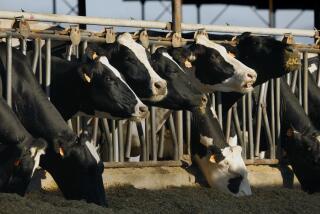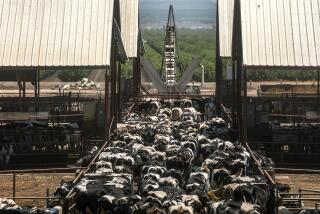Bay Area beef processor sold meat from cows with eye cancer
Rancho Feeding Corp., the Bay Area slaughterhouse that recalled nearly 9 million pounds of beef products last month, sold some meat that came from cows with eye cancer, according to documents obtained under the Freedom of Information Act.
Meat processed by Rancho Feeding was sold to thousands of retail stores, including Kroger, Food 4 Less and Wal-Mart as well as smaller meat markets that cater to Latino customers. The Rancho Feeding recall has also led to a voluntary recall by Nestle of its Philly Steak and Cheese flavored Hot Pockets after it discovered a supplier had bought meat from Rancho Feeding.
In a Jan. 14 suspension letter, the U.S. Department of Agriculture’s Food Safety and Inspection Service said that an investigation of Rancho Feeding showed the company sold cattle “likely affected with epithelioma of the eye.”
Regulators said they found two cattle heads with cancer that had made it to market showing no signs they had been inspected.
The cattle heads did not have the USDA’s mark of condemnation, which would prevent them from being sold, the letter said. They also had intact lymph nodes, which normally would be dissected for inspection. Federal law prohibits the sale of diseased animals for human consumption.
The January suspension was the first action taken against the Petaluma company and affected nearly 42,000 pounds of beef. Less than a month later, the recall was expanded to include a year’s worth of beef — 8.7 million pounds.
The letter, follow-up correspondence and inspection reports for the first time detailed reasons behind the massive recall, among the largest in recent history.
There have been no reported illnesses linked to the company’s meat. Food experts said consumers are unlikely to get sick from eating the beef.
Still, regulators have been aggressive in investigating the company, which they have accused of processing and selling “diseased and unsound animals” without a full federal inspection. In a rare move, the USDA’s inspector general has launched an investigation looking for evidence of criminal wrongdoing by Rancho Feeding.
Wednesday’s documents showed that the Food Safety and Inspection Service was dissatisfied with Rancho Feeding’s initial responses after regulators demanded detailed inspection procedures. Eventually the company was allowed to resume operations in late January, shortly before the regulatory agency announced the Feb. 8 recall of the nearly 9 million pounds of beef.
Calls to Rancho Feeding seeking comment Wednesday went unanswered. An email seeking comment from the USDA was not immediately returned.
After the February recall, a quality control manager for Rancho Feeding said the company had voluntarily taken action “out of an abundance of caution.”
In addition to the suspension letters, Wednesday’s release of documents included past inspection reports that found unsanitary conditions at the slaughterhouse, although it’s unclear if regulatory action was taken before the voluntary recalls in January and February.
In August, an inspector noticed fecal contamination on a carcass. A month before, an inspector noted an excessive number of flies in the slaughterhouse. Other infractions included unsanitary practices by slaughterhouse employees such as failure to properly disinfect surfaces and sanitize knives.
Rancho Feeding, the last slaughterhouse in the Bay Area, was recently bought by Marin Sun Farms, an artisanal Marin County farm specializing in pasture-raised livestock.
Twitter: @rljourno
More to Read
Inside the business of entertainment
The Wide Shot brings you news, analysis and insights on everything from streaming wars to production — and what it all means for the future.
You may occasionally receive promotional content from the Los Angeles Times.









